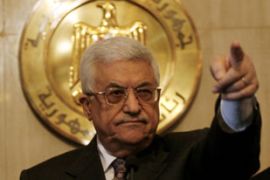Egypt pushes Gaza peace plan
Palestinian president and Hamas officials in Cairo to discuss proposals to end war.

‘Great anger’
Middle East historian Basheer Nafi said: “The Israelis are committing great mistakes – the world as a whole doesn’t like what they see in Gaza and that’s why I think there is more coherence to the Egyptian proposal.
| IN DEPTH |
 Analysis and features from Gaza and Israel |
 Track the war and submit your own reports |
 Send us your views and eyewitness videos |
 Watch our coverage of the war on Gaza |
“Hamas is also a pragmatic force … if this is the last chance to stop this war, I think Hamas will listen to the Egytians.
“There is great anger throughout Egypt. In Cairo, security forces have prevented any major demonstrations. Outside of Cairo, in every single major Egyptian city including Alexandria they have been tens of thousands, hundreds of thousands of people. Egypt knows that.”
A binding resolution passed by the UN security council late on Thursday has failed to bring peace to the Gaza Strip.
Hamas said it was not consulted and that the call for an immediate cessation did not recognise the Palestinians’ right to resist occupation. Israel has argued it has the “right to self-defence”.
Resolving the issue of control over the Rafah border crossing between Egypt annd the Gaza Strip has become central to attempts to end the fighting that has killed more than 820 Palestinians and 13 Israelis.
Under a 2005 deal, Egypt’s Rafah crossing with Gaza, the only one to bypass Israel, can only be opened to normal traffic if European Union observers and Palestinian Authority forces are at the border.
Intense pressure
But Hamas pushed out security personnel loyal to Abbas when it seized full control of the territory in June 2007 and EU monitors left.
The Egyptian government has been under intense pressure from the Arab public to open the border to allow wounded Palestinians out of the Gaza Strip to receive medical treatment but has only let small numbers cross to date.
Both Cairo and the Palestinian Authority on Saturday rejected the idea of an international peacekeeping force being deployed along the border inside Egypt.
“No one has asked for this, and this is a non-issue for us,” Hossam Zaki, an Egytpian foreign ministry spokesman, said.
There had been suggestions that foreign troops could be stationed along the 15km border to stop the smuggling of weapons and basic goods through the tunnels that criss-cross the border.
“We want an international presence in the Gaza Strip, and not on the Egypt-Gaza border,” Abbas said.
Israeli sources told the AFP news agency the Egyptian ceasefire plan calls for the deployment of a strengthened Egyptian force along the Egyptian side of the border, which would be helped by foreign specialists to destroy the tunnels.
Hamas delegation
The Hamas delegation from Gaza, led by Ayman Taha and Jamal Abu Hashem, two of the group’s senior leaders, was to meet with Omar Suleiman, an Egyptian minister tasked with dealing with Israeli-Palestinian affairs.
The Egyptian state news agency MENA reported that the delegation would make “remarks” on the ceasefire plan.
A team from Hamas’s Syria-based political leadership will also be in the Egyptian capital.
Moussa Abu Marzuk, the Damascus-based deputy head of the Hamas politburo, said on Friday his movement wanted “clarifications” on the plan and would reject any ceasefire that did not lift the Israeli blockade of the Gaza Strip.